As I packed to leave Phantom Lake YMCA Camp at the end of the 1968 summer sessions, I told more than few co-workers, “See you next year.” A false statement, I would discover, although not intentionally so as these were times of many surprises.
What looked to be a fun summer on a Wisconsin lake began with a predawn wakeup in New Mexico on June 5 for a trip down Interstate 10 made anxious by my pending first time in the air, American Airlines El Paso to Chicago. I preferred trains, but after solo rides the two previous summers, the Santa Fe that spring annulled our passenger train after 87 years.
As my mother cruised past a commercial truck mangled overnight in the median, presidential candidate Robert Kennedy lay on a surgical table in Los Angeles with bullet fragments in his head. I only learned of this latest political shooting after a 100-mile bus ride from O’Hare to where a cousin from my Illinois hometown could pick me up. By then Kennedy had only hours to live.
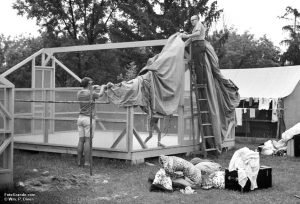
Counselor Keith Christensen on the ground and Phantom Lake YMCA Camp director Sir Gerald Carman on the ladder place the canvas top and sides on a new tent floor and frame. Summer 1968. Photo © William P. Diven. (Click to enlarge)
A week later Phantom staffers, among them many familiar faces, arrived in good spirits across the lake from Mukwonago, the place of the bear, in native dialect, and a highway crossroads 20 miles southwest of Milwaukee. Counselors stashed their gear in tents arrayed on the flat hilltop above the lake while the kitchen crew, stable hand and a few program specialists found rooms and bunks in The Hilton, a two-story dorm on the service road at water’s edge. After a bit of camp maintenance we gathered at 5:30 in the dining hall by the boat docks.
Staff training began there with the dining hall steward, he being 17-year-old me, explaining mealtime procedures, morning, noon and evening graces and how each day one of the 17 tents — campers, junior counselor and counselor — would act as waiters, cleanup crew and dishwashing help. Then came four pages of camp songs to be sung with gusto (“Who’s Gusto?”) and a talk by camp director “Sir” Gerald Carman on staff leadership and Phantom’s camper-comes-first philosophy.
Over the next three days staff bonded as training covered priorities from parental expectations and campers’ spiritual growth to creating lively programs and dealing with emergencies. Those of us in the kitchen and dining hall managed to skip most of that staying busy with meals and snacks for evening training sessions. On Sunday afternoon we welcomed the first group of 8-16-year-old boys, an enthusiastic mob of rural, suburban and inner-city kids filled with mixed emotions and expectations for 10 days on a lake.
Beyond the shelter of Phantom Lake’s wooded shores lay a country roiled by increasingly ugly war overseas and civil unrest at home although “unrest” doesn’t do justice to the riots and cities in flames. Barely two months had passed since the April 4 assassination of Rev. Martin Luther King Jr. at age 39 set Memphis ablaze, and it was not yet two weeks since Bobby Kennedy perished at 42. His brother, President John Kennedy, lived to 46 before being gunned down in Dallas in 1963 a few months after a white supremacist shot combat veteran and civil rights leader Medgar Evers in the back as he walked from his car to his home in Jackson, Miss. Evers was 37.
I viewed the war in Vietnam, the civil rights movement and the 1968 presidential election as a soon-to-be high school senior alert to politics but too young to vote or be drafted. Camp counselors, however, were on summer break from colleges clouded by raucous debate if not clouds of tear gas. A college man with a year of draft deferment left knew this could be his last summer on the lake for years, possibly forever. We let none of this intrude on the campers’ fun, though, and by the time four boys’ and three girls’ sessions ended, Sir Gerald would count 1,119 campers he hoped left with fond memories of Phantom, the second oldest YMCA camp in North America founded in 1896 as Camp Hope.
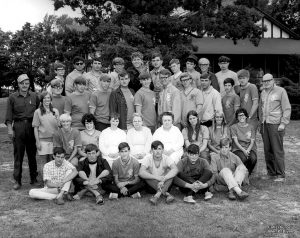
Phantom Lake YMCA Camp staff for the 1968 boys’ sessions. Standing in the third row are camp director Sir Gerald Carman (far right), junior counselor Davey Stephens (third from right) and dining hall steward Bill Diven (sixth from right). The name of commercial photographer who took the photo is not known. (Click to enlarge)
Ignoring the outside world came easier than in 1967, a particularly hot summer for cities with unresolved issues of race and justice. Milwaukee exploded in violence quelled by a curfew and the National Guard, which stopped regular food deliveries to the camp kitchen. Head cook Marge Hess juggled the pantry and shopped nearby towns, and when the bread man finally returned, we gathered around his truck to marvel at the bullet hole behind the driver’s door.
This was my sixth summer at Phantom enjoying routines little changed since my mother attended in the 1930s. I’d been a camper for two years when director Harley Van Akkeren of the Milwaukee YMCA hired me to work the kitchen and wash dishes. Sir Gerald, who assumed command in 1966 after the Waukesha Y took over, promoted me to steward the next year.
The steward job mostly meant squaring away the tables, condimentally speaking, supervising camper-waiters, helping in the kitchen and last thing each evening spreading a sweeping compound around the venerable planking. Rock ‘n’ roll accompanied the sweeping courtesy of WOKY-AM — Waukee in Milwaukee — playing at low volume the music beginning to bump show tunes and classical music from my playlist. I still wonder how much that oily cleaning compound aided the fire that razed the building some years later.
I moonlighted as the Phantom Crier making announcements during meals while answering to the nickname White Socks, an unfortunate moniker for a loyal Chicago Cubs fan and a sad commentary on my fashion sense before the intervention.
Despite the camp philosophy, my growth tilted more social than spiritual. The flattop haircut disappeared in time for junior class yearbook photos, and tube socks were reserved for gym class. Rich Schmid, a Chicago-area kid, wised me up to dork-status white socks as we readied for a junior counselors’ evening outing to a Buckinghams’ concert in Lake Geneva. The nickname White Socks carried over to a second summer but luckily never found its way back to New Mexico.
In 1968 I belonged to two worlds within Phantom, the first among the paid staff ($250 for the summer) albeit among the youngest along with three pals working the kitchen and the dishwashing machine: Mark Grossman, Bob Ester and Davey Jones. The second world contained the junior counselors designated LITs, Leaders in Training, high school guys each assigned to a tent. Though the LITs were my age, I spent less time with them as they adhered to camper schedules while staff and counselors could gather in the lodge after Taps and linger until midnight.
Bearing my newly minted driver’s license, I rumbled into Phantom commanding a battlecruiser on wheels, a 1959 Mercury Monterrey with an appetite for transmission fluid and front and rear decks suitable for helicopter landings. Fleetingly my first car, it would return to the friend-of-the-family Ford dealer in Oregon, the Illinois hometown we left for the Chihuahuan Desert four years earlier. The August speeding ticket from the tiny-town police chief was cheap enough and sharpened my driving skills, but it embarrassed me in front of my passenger, the college girl from camp bumming a ride home on my way elsewhere.
Summer staff enjoyed a day off each week, which usually meant laundry in Mukwonago, a chocolate malt at the Rexall counter and hanging out at the Soo Line depot photographing trains and BS’ing with station agent Doug Seibert between his rants against hippies and the government. In summers past I would hike to Muk heading east out of camp to walk the electric Municipality of East Troy Railroad into town or borrow a camp canoe to paddle through the marshy connection between Upper and Lower Phantom to the landing by the Highway 15 bridge. Even with a car, road trips mostly in search of trains were few as gas, film and transmission fluid strained the meager budget.
Camp rules covered everything from your appearance to on- and off-site conduct. Few breaches surfaced, but young adults will be young adults, or in some cases, not quite adults.
Staff member agrees that while in the employ of the camp, he will adjust his personal habits and actions to the aims and objectives of the Young Men’s Christian Association, and to so conduct himself at all times, both in camp and away from camp, that he will be a credit to himself and to the camp; to refrain from frequenting taverns and places of questionable amusements, and to keep hours and habits which will enable him to maintain an excellent physical and mental condition.
— Personnel Policies of Phantom Lake YMCA Camp
While I might object to moonlight skinny dipping being a questionable amusement, one policy prohibited lending your car, which people did anyway. So early in the third boys’ session I handed the keys to the Merc to a counselor with the night off. A friend from past years, he came from a nationally prominent political family, and I considered him trustworthy. Well after Taps, I left the lodge descending the stairs to the dining hall and the road to the Hilton. Instead a distant ringing drew me to the kitchen phone and the voice of a Lake Geneva police officer saying he had in custody three underage drinkers who claimed to be camp employees. The two older boys were in jail, but the younger one at 17 was a juvenile the police wanted to turn over to his parents. Oh, and they’d impounded a ’59 Mercury.
I rousted Sir Gerald from his nearby cabin, and he told the officer he could take charge of Davey Stephens, one of the LITs. The drive to Lake Geneva felt longer than the 18 miles and was mostly silent although Sir Gerald did comment on my breach of camp rules. I reclaimed the Mercury without seeing the two counselors then or ever again. Davey, the most popular and personable of the LITs, also lost his position but continued to make discrete visits to camp on his motorcycle. Multiple lessons learned that evening although mine came at the least cost.
Sir Gerald now found himself two counselors short with the fourth boys’ session still to come. In short order he placed me in charge of 10 boys in the tent named Cripple Creek, hired my Illinois cousin John Putnam to take over Tombstone and named Grossman dining hall steward. I thought some day I might become a Phantom counselor never imaging there would be a draft.
My band of 10- and 11-year-old boys became a challenge in responsibility and crowd control. It went well, on the whole, from my perspective, and pictures from the last day of one session show everyone in apparent good humor, even the kid who ran away. He hightailed it for the hills over taunting about his play in a softball loss and almost reached the camp fence when I caught up with him. We talked it out and continued the conversation with his tent mates that night. Overall Phantom survived its personnel crisis and the surface changes only lightly explained to the campers.
I don’t know what my campers thought, but no parents complained to Sir Gerald. Still, insight bubbled from the experience. In truth I wasn’t counselor material since quiet-time talks with campers before Taps were supposed to lean toward character development and spiritual topics with maybe a Bible verse or two in the mix. My Bible, however, rarely left its shelf 1,500 miles away. So the boys heard random tales with maybe a life lesson or two but more likely snippets of comedy routines cribbed from my parents’ Phyllis Diller and Bob Newhart records.
If anything that recognized a drifting from organized religion begun with dinosaurs, newspapers, “All About” books and an activist public librarian. It sped up after the move to New Mexico when my father and our minister had some kind of falling out. When Dad quit going to church, so did I. Yet this was less fleeing a church than being pulled into a complicated a world. My brothers and I were raised Presbyterian, a friendly faith whose idea of a religious experience was a potluck dinner in the church basement with a slide show by a missionary family back from Africa. A miracle meant no one getting sick from the macaroni salad.
With the opening of girls’ camp, I gladly shed my temporary responsibilities returning to the dining hall where Grossman went back to operating the dishwasher while I swept the floor. Cousin John stayed on in the kitchen under head cook Hazel Salentine and her assistant, Jane Conrad. From my view camp ran smoothly from there with plenty for the Crier to report, little trouble with campers assigned to dining hall detail and ample time between meals to swim, boat, read or just relax in the rolling beauty of the kettle-and-moraine country formed by the last ice sheet. Staff camaraderie remained strong to the point I went on my first date rolling the Merc to a drive-in movie, “Pennies from Heaven,” with a girls’ counselor on the same night off. A small step it was, but in a new direction worthy of further pursuit.
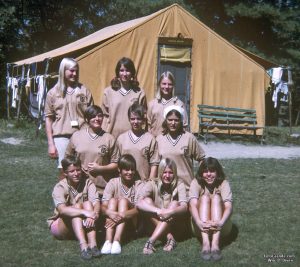
Leaders in Training aka junior counselors. Phantom Lake YMCA Camp girls’ sessions. Summer 1967. © William P. Diven. (Click to enlarge)
Current events still intruded flickering into the Hilton via black-and-white TV when the Republicans in Miami Beach nominated Richard Nixon for president. It fell to me to explain a baffling and angry speech delivered to the convention by Gov. David “Lonesome Dave” Cargo, who headed the New Mexico delegation. I was clueless, but some years later Cargo told me he was a Rockefeller delegate riled by Nixon henchmen squeezing him to change his vote. Happily camp ended before the late-August rioting in Chicago where Democrats nominated Hubert Humphrey.
During one of those evenings, the girls’ LIT director appeared at the door in tears. Davey Stephens was dead, killed on his ride home from Phantom when a driver pulled into the path of his motorcycle. He was the second friend killed in a motorcycle crash that year although the first rode hard, gambled at speed and lost. A sports award still is given in his memory. Davey had the right-of-way, but it didn’t matter.
In December, Sir Gerald wrote to us requesting our job preferences for 1969. They were due by Jan. 15, the day before I turned 18 and became eligible for the draft. With college coming, a summer job with real wages held some appeal. And I had become politically active campaigning to lower the voting age to 18 on the premise you should have some say in who sends you to die in a foreign hell hole. By fall I’d be marching against the war but spent summer ’69 taking government money to pound survey stakes in the desert for a road across White Sands Missile Range earning union scale, $3.20 an hour plus overtime. Grossman moved up to dining hall steward and inherited the push broom.
No stark decision led away from another season on the lake, just the lure of something unknown down a road with forks not yet in view. Even with the unsettled world outside, Phantom no doubt kept its calm the next summer and in summers since, working its magic and imparting bits of wisdom on kids all too soon to be finding their own way.

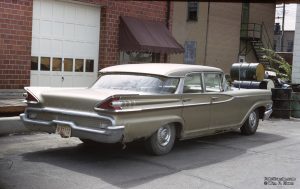
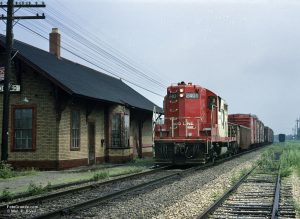
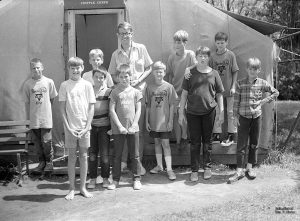

I too had a series of YMCA camp experiences but could have never told them with such detail and in such smart context with life and what was going on while sequestered in paradise. You remain one of the best storytellers I ever got within arms length of.
What a great read Bill!
I have gone to Phantom Lake for multiple years now, and this summer I am going to become a CIT. This was a wonderful piece to read and hear about camp from someone else’s perspective. Thank you for sharing!
What an excellent story!
I started PLYC as a camper that same year.
Wow- what a great narrative! I followed at camp a bunch of years later and so many of the experiences you talked about rang true for me, my family members, and some friends. Thanks for sharing this!
I too have fond memories of Phantom Lake YMCA camp brought back to life by this wonderful narrative. I will never forget “Sir G” and many others (Ted Anderson, Tom Loversky, Walt Stewart and many others come flooding back to my mind).
What a great read and thank you for bringing back such wonderful memories!